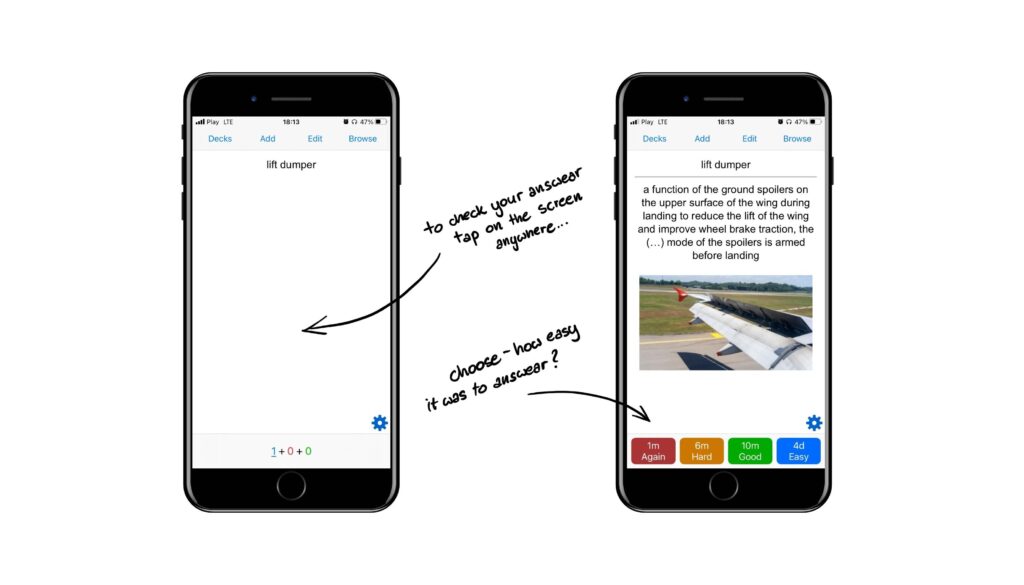What's this article about?
In this article I describe how I approach studying for my ICAO English exams. I present a scientifically proven studying techniques, that are so simple to apply and can help you a lot, as it helped me. It is based on the fact, that we actually tend to forget stuff we learned over time, if we don’t use it on daily basis. When I mean „studying for an ICAO English exams” I assume you already know plain English well. Being a fluently speaking pilot is a matter of combining plain English you already know, with quite a massive amount of new aviation and engineer’s vocabulary – using it with some key rules of air communication.
Let’s get down to real examples, how many times did you learn an english word, rule, phrase, but you just didn’t use it much and now you can barely remember it? I’d rather say you actually don’t remember anything. Well, I figured out that it’s not such a big deal to easily memorize huge amount of stuff over time, when you have the tools described below…
Where the idea came from...
Ok, so last year at my uni I had this ambitious vibe of becoming a total nerd in order to apply for ATPL flight course (I study aviation, by only few of the „top” students can apply for the course while studying). It’s a long story, but what I want to share with you is that then I thought „hey, as I am gonna be studying for hours everyday, why not to master my ”studying techniques” first, and then spend 1000 hours in the library – in a more efficient way. I just thought hey, maybe I could achieve more with less effort, have more time for the people around me, etc. That was the time I sort of dove into this YouTube content „How to learn more efficiently” „Scientifically proved studying techniques” and all that jazz. I learned about sth called „active recall” and „spaced repetition” – and that turned out into quite a massive change of my approach and most importantly – results.
Science behind it
So, just to briefly describe what the things mentioned above are, let’s imagine that each time we learn, or try to memorize something a neuron connection is made in our brain. It is very solid for the first couple of hours but then it kinda gets weaker and weaker. So after a short while, but when we still remember this thing – we should try to recall this information. Now the refreshed connection also gets weaker over time, but way slower than previously. So next time we can recall it after a couple of days, next time after a month, then after half a year and so on… But the point is that in the end with this method we can memorize stuff forever, and it’s easy for us to retrieve this information, any time we need it.
Ok, so now you probably think that I am a massive nerd talking random shit that just helps to theorize studying process for the ones that just like to think about things, rather than actually do them.
And I totally get that, because I was not actually willing to give you the best, encouraging explanation of the things above. Because what’s the point of doing it, when somebody else has already done it gloriously. That’s why I attach 2 links below, where one smart guy explains it way better. If you don’t want to watch the whole videos (I would advise it anyway), here you got the essentials – which are in total 3 minutes and 57 seconds of content…
Watch the essentials of this one:
07:30-8:11
Watch the essentials of this one:
01:06-04:22
So the techniques mentioned above probably won’t be a total game changer for you. We all use them more or less consciously. But the point is to understand the theory behind them and start using theme to learn Aviation English, ATPL theory, etc. Isn’t it better to have a full control of the process, rather them depending on an increasing pressure over time, that desperately makes us study harder when we have less time until exams? Well, it all defense of your approach, do you want to study just to pass your ATPL/ICAO exams? Or you want to squeeze the studying time efficiently, so that you are a master, well qualified that’s not really stressed about getting his job, regarding the situation on the market.
Probably 80 % of views these videos get on YouTube are from law or medicine students. But the purpose of this article is to show you how I managed to apply them to learning aviation English way faster, with less effort, and in the way that you won’t forget it over time.
So let’s get down to the core of this article…
How do I use this tools to study aviation English?
Well, planning spaced repetition on your own, e.g. with paper flashcards, inventing your own time intervals and sticking to it doesn’t seem to be easy peasy. That’s why a certain guy invented „Anki” app. This app allows you to create your own flashcards, customize it, and it automatically applies the time intervals for spaced repetition for you. It prepares a daily set of flashcards for you to revise – every single day. The only real challenge here is to stay consistent. But in the end, when you use it only for English vocabulary you don’t have that much of them. It takes me around 10 minutes per day on average to quickly scroll through all the assigned flashcards and revise them. About creating a flashcard, it takes me around 10 seconds on average to create one, when I copy the text from pdf document. Not that bad, huh?
I personally create my own deck in Anki based on a vocabulary list from pdf file, which was provided by my flight school. Ask about some files in yours one, or find it in the internet, there are thousand ways. Of course, I would like to share my deck with you, but I’m just afraid I am not allowed to do it, as for commercial purposes, when it’s based on Cambridge’s publishing house.
Ok, let’s go – as an example I will show you one of the flashcards I have recently created. In Anki it looks like this:

When I want to check the answer I tap once on the screen and these buttons show up. Here I can choose how hard it was for me to retrieve the word meaning, and according to this choice the algorithm will apply a specific amount of time, when I should revise it again and it will bring it back to me when the time comes.
Honestly, I use the app for over a year now and it totally changed my approach. I use it for other stuff too, not only vocabulary. E.g. I always struggled to memorize the lightning signals for the aircraft in case of a loss of contact. Like “white flashes for aircraft in the air mean it must land at the aerodrome and continue to the apron. Landing clearance will be given in short while”. So yeah, this is the thing I don’t use so often (and I wish it stays like that). But in case of an emergency I should automatically interpret the light message given by the tower and that’s what I use Anki for. Of course, the majority of the aviation knowledge is engineering stuff that you’d rather understand deeply, than just memorize. But with this methods I memorize only the things, that actually require it and honestly – it feels so good to have it all in control.
About installing the app, there are numerous tutorials how to set up and technically use Anki app on your phone, laptop, iPad – so I won’t mess up with it in this article. Web browser version is available as well.
One more thing, Anki didn’t pay for the advertisement, although I wish it did. I just love the idea behind the app, the concept of it, and wanted to share how I use it as a student pilot. So if you found it helpful, I’m just glad I could help you. Feel free to give me some feedback on email, Instagram or Facebook, because I am just starting with this blog and it would be kinda nice to hear from some readers, if they even exist, so thx for sticking around.


